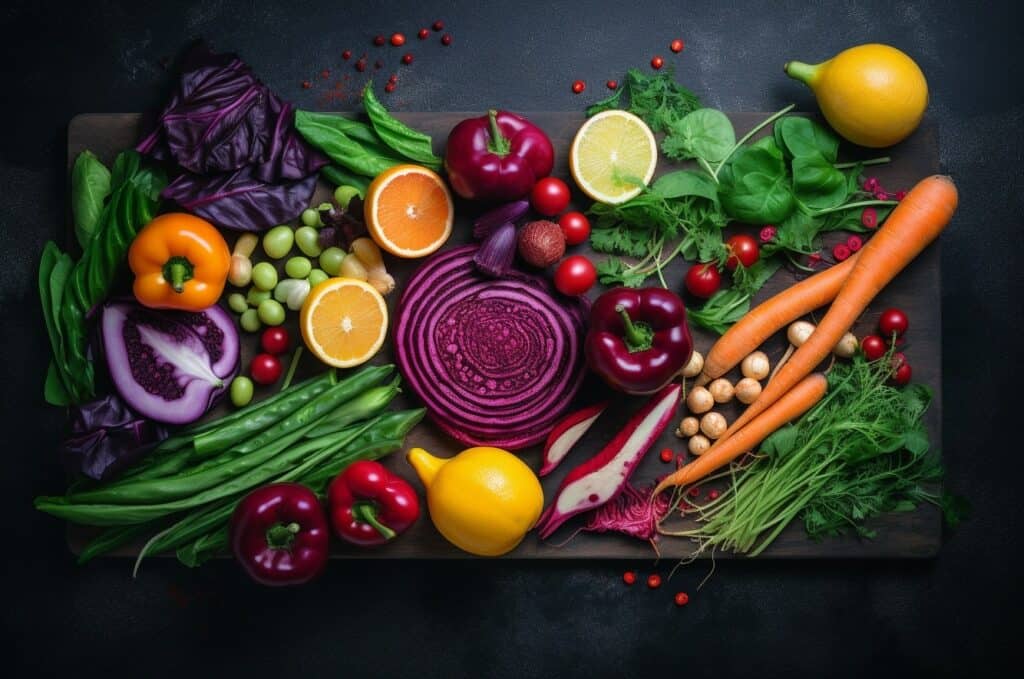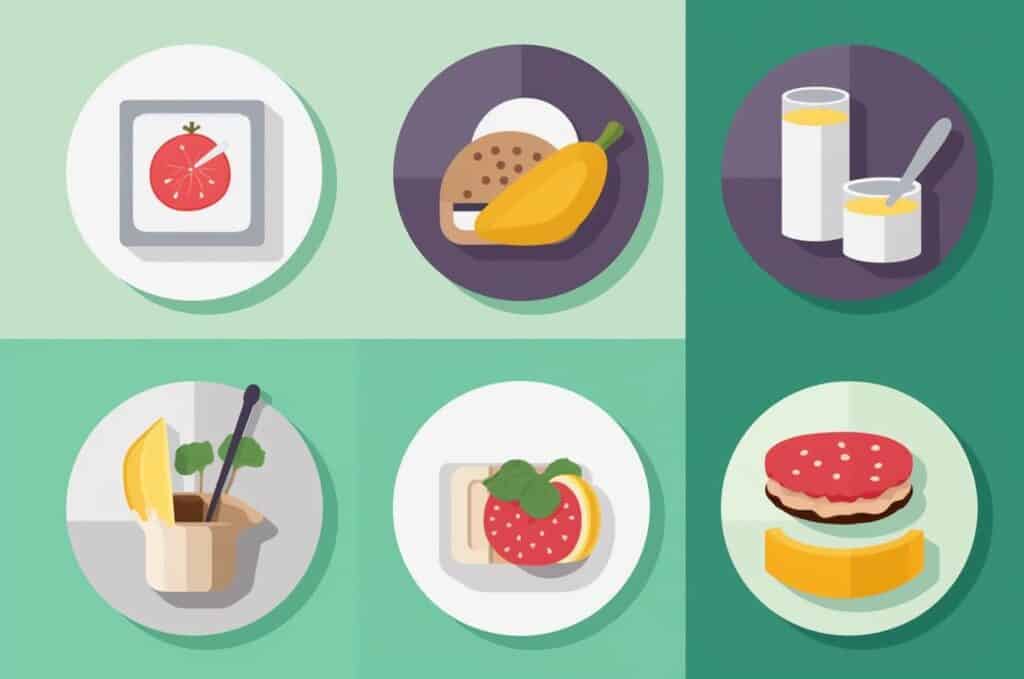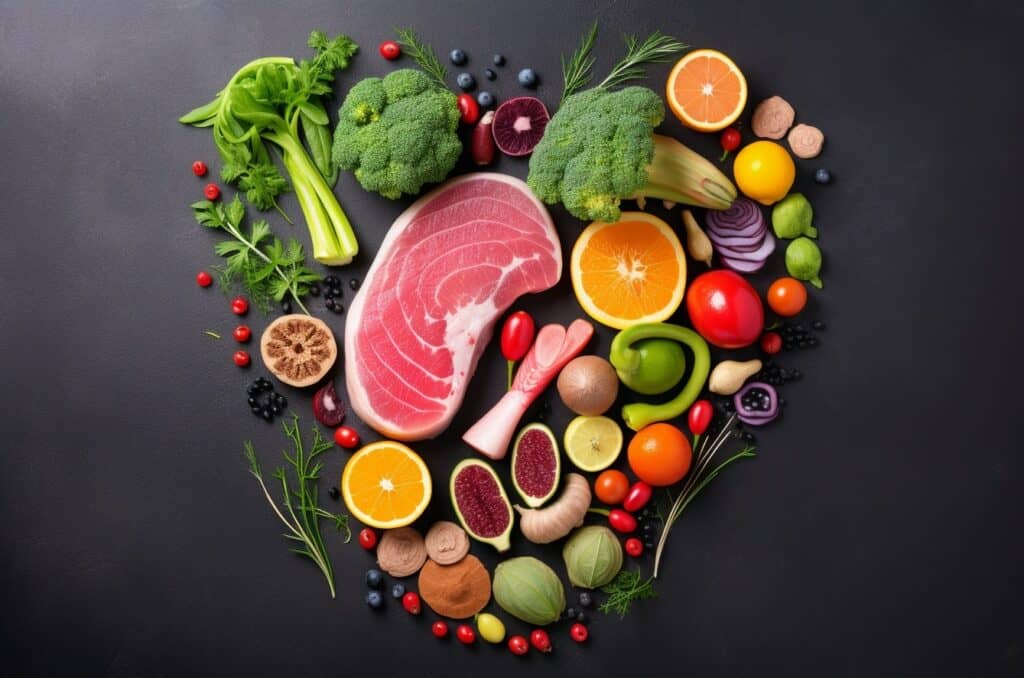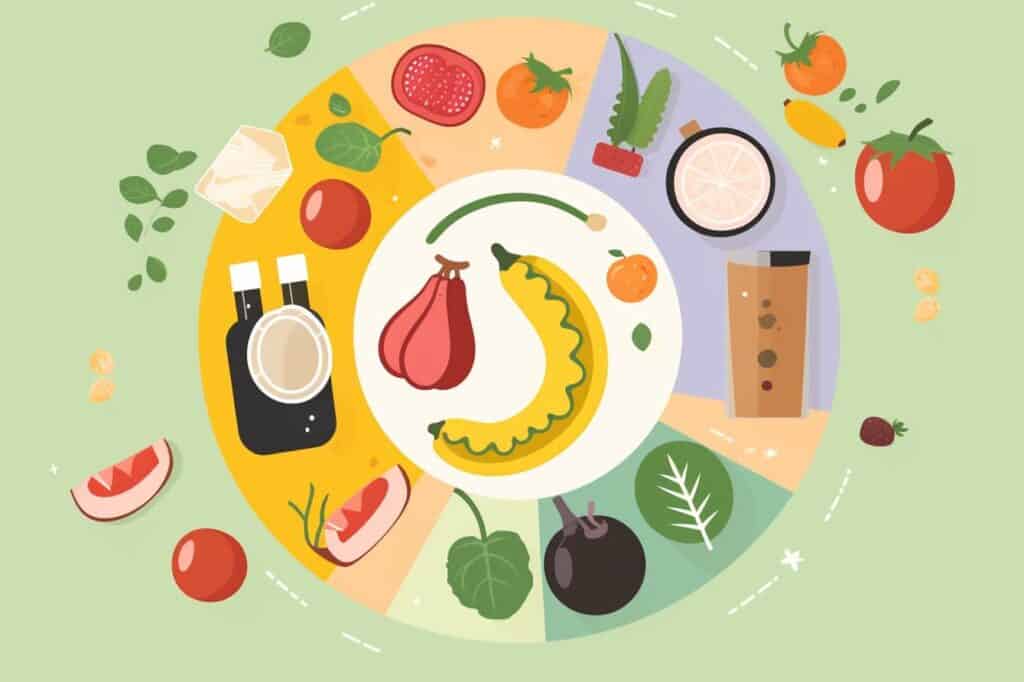Do you suffer from digestive problems such as constipation, bloating, gas, heartburn, indigestion, acid reflux, or diarrhea? If so, then you need to read this article!
There are several reasons why your digestion could be affected. Some of these include stress, lack of sleep, eating too much processed food, consuming alcohol, caffeine, sugar, and gluten.
I’m going to share my top 15 tips for good digestion. These tips will help you improve your overall health and wellbeing.

1. Eat in order of digestibility
Eat the simplest things first in each meal and then gradually move on to the more complex foods.
Imagine driving on a highway. When the slowest cars are out in front, they’ll block the faster cars that are behind them, leading to a traffic jam. The same with your food.
First, eat the easiest to digest foods like fruits and soups, then move on to the harder ones like meat and poultry.
Here are the general digestion time sequences/emptying from the stomach times for different food groups:
- Water & Juices: 20-30 minutes
- Fruits, Smoothies, Soups: 30-45 minutes
- Vegetables: 30-45 minutes
- Beans, Grains, Starches: 2-3 hours
- Meat, Fish, Poultry: 3 or more hours
2. Drink warm or hot liquids with your meal
Cold drinks can slow down digestion by cooling off the stomach lining. Think of it like icing an injured muscle. If muscles become stiff, they don’t perform their functions as effectively.
Drinking warm or room temperature beverages such as water, juice, or even decaffeinated teas before eating may help promote better digestion.
3. Eat at regular meal times
Eating regularly and at specific times of day is important for maintaining good digestive health. Consuming foods from the same group (e.g., protein) and eating them at roughly the same time every day helps regulate digestion. Regular in means regular out.

4. Be conscious of what you eat and your portion sizes
It’s important to eat enough but not too much at once. Eating too much is the number one cause of indigestion.
Our brain tells our body its full ten minutes after the body is actually full. Stop eating when you feel satisfied. Odds are you’ll actually feel full ten minutes later!
5. Chew your food completely and don’t talk while eating
If you chew slowly enough so that every bite has been chewed completely before moving onto the next one, then there won’t be any swallowed and ingested air.
Digestive discomfort occurs when there isn’t enough time for nutrients from foods to be absorbed into the bloodstream before they’re digested by enzymes in the small intestine. If you chew food into smaller pieces, they’ll be easier to digest fully.
6. Relax while eating your meal
When you’re under time pressure, eating quickly makes things worse by increasing your stress levels and slowing digestion. When eating, create a calm environment by making yourself comfortable. Make sure you can spend some quality time enjoying your meal.
7. Practice good posture
If you slump or hunch over when sitting down, extra pressure is placed on your abdominal organs. Poor digestion may be caused by too much pressure.
Practice sitting up straight with your shoulders back and tucking your chin in when you’re eating. It will give you more space for your digestive system so that it has enough room to digest food properly.
8. Don’t eat late at night
As we get closer to bedtime, our body and digestive system slow down so that it has time to prepare for sleep. Late at night when we eat too much food, there aren’t enough digestive enzymes to break down the food for us.
The undigested food will then sit in your stomach for a longer period of time and most likely disturb your sleep.
- Related article: Best Digestive Enzymes for FODMAPs

9. Take a brisk walk after eating
The “don’t exercise for 30 minutes after meals” rule is a myth.
In addition to helping jumpstart your digestion, increased physical activity also boosts the production of digestive enzymes which help break down foods into nutrients for easy absorption by the body. It’ll help you get better results from your meals by making them easier for your body to completely digest.
10. Try a spinal twist
Excess toxins in the digestive tract can cause stress, so spinal twists help release them from the body.
Sit in a cross-legged position. Slowly turn to the right and hold the position while taking 5 deep breaths. Repeat the process while turned to the left side.
11. Eat A Balanced Diet
A well-balanced diet is crucial for maintaining healthy digestion.
Consuming fiber-rich foods and digestive enzymes can significantly aid in the process of breaking down food and absorbing nutrients.
Fiber helps to add bulk to stools, easing their passage through the digestive tract while also promoting regular bowel movements.
Incorporating fruits, vegetables, whole grains, legumes, nuts, and seeds into your daily meals is an excellent way to increase your intake of fiber.
These foods are rich in vitamins and minerals that nourish your body while keeping your gut healthy.
Additionally, consuming a variety of plant-based foods ensures you get enough prebiotics — non-digestible fibers that feed good bacteria in the gut.
Digestive enzymes help break down large molecules from food into smaller ones that our bodies can absorb.
They assist in digesting carbohydrates, fats, proteins, and other essential nutrients needed for proper bodily function.
Some people may have difficulty producing sufficient levels of digestive enzymes naturally; hence incorporating such supplements or eating more enzyme-rich foods like papaya or pineapple can be beneficial for them.
Eating a balanced diet with plenty of high-fiber foods and incorporating digestive enzymes can do wonders for improving digestion health.
12. Stay Hydrated
1. Adequate hydration is an important factor for good digestion. Drinking water regularly and consuming water-rich foods are two key components of staying hydrated.
2. The recommended amount of water intake for the average adult is eight 8-ounce glasses per day. Water-rich foods, such as fruits and vegetables, can also contribute to daily water intake.
3. It is important to be aware of the water content of foods as sources of water vary. For example, some fruits, such as watermelon, can contain up to 92% water, while other fruits, such as apples, may contain only 84% water.
4. Staying hydrated is an important part of a healthy digestive system. Drinking the recommended amount of water daily and consuming water-rich foods can help ensure adequate hydration.
13. Manage Stress
Identifying stress triggers can be an important first step in managing them. This can help to create an awareness of the sources and situations that may be leading to increased stress.
Developing coping strategies can also be beneficial for managing stress. These strategies can include both short-term and long-term strategies, such as relaxation techniques and lifestyle changes.
It can also be helpful to seek professional help in developing a plan to manage stress.
14. Incorporate Probiotics And Fiber
Probiotics are live bacteria that support the growth of healthy gut flora. They are found naturally in fermented foods like yogurt, kefir, kimchi, and sauerkraut. Including these foods in your diet can improve digestion by promoting the growth of beneficial bacteria in your gut.
In addition to probiotics, adding more fiber to your diet is another way to support healthy digestion. Fiber helps keep things moving smoothly through the digestive tract, preventing constipation and other uncomfortable symptoms. Foods high in fiber include whole grains, fruits and vegetables, nuts and seeds, and legumes.
Foods to try:
- Greek yogurt
- Kefir
- Chia seeds
- Tempeh
Benefits of probiotics:
- Improve digestion
- Boost immune function
- Reduce inflammation
- Prevent antibiotic-associated diarrhea
Incorporating probiotic-rich foods into your diet along with high-fiber options can lead to improved overall health.

15. Exercise Regularly
Physical activity is essential for good health, including the digestive system. Exercise can aid in digestion by increasing blood flow to the organs and stimulating intestinal contractions. A sedentary lifestyle can negatively impact gut motility and lead to constipation or other gastrointestinal problems.
Yoga is an excellent form of exercise for promoting healthy digestion. Practicing yoga postures that involve twisting movements can help stimulate peristalsis, which is the wave-like movement of muscles in your intestines that propels food through your digestive tract. Additionally, certain yoga poses such as downward dog and child’s pose may also alleviate bloating and gas discomfort.
It’s important to note that timing plays a critical role when it comes to exercising for optimal digestion. The best time to engage in physical activity varies from person to person based on their schedule and personal preferences; however, many experts recommend waiting at least 30 minutes after eating before engaging in any strenuous exercises like running or weightlifting.
On the other hand, low-intensity activities like walking or gentle stretching may be done immediately following a meal without causing any adverse effects on digestion.
Regular exercise has numerous benefits beyond just improving digestion, including reducing stress levels and boosting immunity. Incorporating even small amounts of physical activity into daily routines can have positive impacts on overall health and well-being.
So whether you choose to practice yoga or go for brisk walks every day, making regular exercise part of your routine will undoubtedly benefit not only your digestive system but also your entire body.
Good Digestion Tips Final Thoughts
All in all, good digestion is essential to a healthy lifestyle. Try these tips first as they’re simple ways to improve your digestive health and make life more comfortable.
Check out these other articles to read more about good digestion:
- Best Foods to Relieve Gas and Bloating
- Reasons for a Tight Feeling in Stomach
- Activating the Vagus Nerve for Better Gut Health
- Food in Stool Undigested

